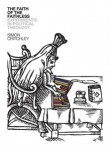Under the pretense of talking about pirate theology, Peter Rollins, Kester Brewer and Barry Taylor gathered to discuss “radical theology” at Fuller this month. Rollins, in particular, analyzed the intersection between psychoanalysis and theology, arguing that Christians need to experience doubt like Jesus on the cross, asking God, the father, “My God, my God, why have you forsaken me?” After much contrived discussion, the panelists concluded that radical theology will lead to the death of Christianity as a religion in order that a new manifestation of Jesus-following might emerge. While I sympathize with Rollins and co.’s intentions, I am not certain how radical theology’s psychoanalytic approach relates to non-western contexts. Moreover, their assessment of radical theology’s (read: Emergent Church) role in church history falls victim to the same dialectical trap that Rollins critiques in his work…
Atheism is all the rage today. That is, a kind of rejection- whether a traditional form of atheism, or the Christian rejection of certainty- is catching on. Some in the emerging church circles call for an “epistemological humility,” a theological hedging that tempers a rigid Evangelical orthodoxy. Still others, such as Peter Rollins, turn to more philosophical traditions, such as that of Hegel, which value a “negation.”
Rollins summarizes this kind of Christian A/theism in a number of places, and thus offers a helpful summary in his chapters in Church in the Present Tense. Providing a kind of archeology of modern categories through the thought of philosophers like Kant and Hegel, he states that there is a moment of negation when the ideas and values are denied. In turn then, he says, there comes a moment of double negation- that place when even the denial is denied.
Unfortunately, Peter and his philosophical partner Hegel are about 1700 years late. The desert monks spoke of a similar path, just without the seeming circularity of modern critiques of metaphysics.

In Simon Critchley’s Wildean confraternity or consorority of the faithless, faith is a commitment, a proclamation of fidelity to an infinite ethical demand which enacts a new form of subjectivity. As such, faith is not related to belief in the existence of God but to an experience that is shared by agnostics, atheists and theists alike. Faith, we might say, is a/theistic, cutting across such distinctions.
